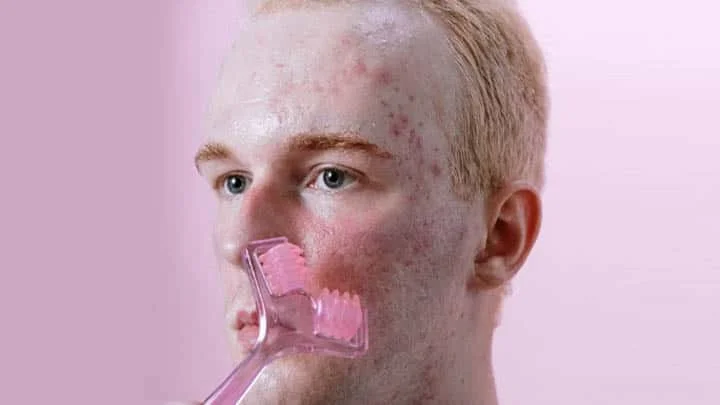People of different age groups (especially teenagers and young adults), gender, or race are prone to suffer from the most common chronic inflammatory skin condition called acne. Acne is the most common skin disease in the world, and this inflammatory skin condition occurs when the hair follicles present inside the skin become plugged with oil, bacteria, pollutants, and dead skin cells. It causes redness on the superficial skin. Acne commonly occurs on the face but can also be found on the back, neck, chest, and shoulders.
Causative factors
Primarily, this kind of skin lesions appears when there is clogging of hair follicles located underneath the skin or pores by:
- Excess of sebum (oils) production.
- Bacterial growth (Propionibacterium acnes).
- Accumulation of dead skin cells.
Acne, which appears after the age of 25, is called adult acne. In adult acne, the acne mostly appears around the mouth or jawline and tends to be deeper, more painful and often causes deeper acne scar. This type of acne does not respond to creams and has a lifestyle or hormonal problem underlying it. Hence, consulting a dermatologist is important to cure this type of acne.
One can consult Dr. Rasya Dixit at Dr. Dixit Cosmetic Dermatology Clinic to cure acne skin conditions effectively. Dr. Rasya provides treatment for the acne skin condition, only ruling out the main cause of the concern, which effectively addresses the concern.
Secondary factors can be
Changes in hormone levels (i.e., hormonal imbalance): Usually, there is a rise in the sex hormones that stimulate the oil glands for excess sebum production. This takes place at the time of stressful conditions, pregnancy, intake of birth control pills, puberty, or menstrual cycle in women.
- Diet: When a person indulges more in carbohydrates such as food with a high glycaemic index (like chocolates and sweets) and excess dairy products, then acne formation can be triggered.
- Family history: The type of acne is based on the skin type that is determined by the genes. Patients that have oily skin have reported that they have more tendency of appearance of acne on their skin as oil clogs the skin pores.
- Climate: Excess moisture content in the environment can lead to the secretion of more sebum in the body. Hot weather can cause dehydration of the skin resulting in acne formation. Even extremely cold temperatures can have a negative impact on the skin.
- Applying oily skin creams and thick lotions can also trigger acne formation.
Types of acne
Acne can be classified into:
1. Inflammatory:
Pustule: It is a raised portion of the skin (bump) with a red or pink base and a white to yellow coloured pus-filled centre.
Papule: It is a pink or red, round and raised bump (of less than a centimetre) on the skin without any pus-filled centre.
Cyst: It is an extreme form of acne that lies deep within the skin and results in scarring. It covers a large portion of the skin as a bump with a pus-filled centre.
Nodule: It is the larger form of the papules associated with pain and inflammation. It is formed when the tissues break deep within the skin's surface.
2. Non-inflammatory:
Whitehead: It is a white-coloured tiny bump sometimes having a hair follicle in the centre that does not cause scarring.
Blackheads: These are opened forms of whiteheads that appear as black and tiny.
What is the best treatment for acne in Bangalore?
Self-medication can be harmful to the skin and can do more damage to the skin. It is important to consult a skin doctor to treat the concern.
Dr. Dixit Cosmetic Dermatology Clinic's primary mission and the ultimate goal is to help patients achieve clear and healthy skin. Success treatment of acne requires the help of a specialist. It is essential that proper acne treatment must be provided, as this also helps to prevent the occurrence of acne scars. The clinic utilizes the best innovative technologies for Acne Treatment in Bangalore, which includes:
Topical medications: Best for mild and moderate acne and help prevent the occurrence of new lesions. It includes topical reti-noi-ds, and antimicrobials to cure acne conditions.
Oral medications: Antibiotics, retinoids and anti-androgen agents are advised to control inflammation and bacteria growth.
Chemical peels: Different concentrations of chemical peels are used to treat acne conditions. The peels are customized based on the severity of the condition, and the peels have antibacterial, anti-inflammatory, and comedolytic effects to reduce excess sebum production. Chemical peels exfoliate the upper layer of the skin, thereby allowing the comedones to be removed without pain as it helps dry out acne. The treatment also reduces pigmentation associated with acne. The most used peels are Glycolic peels and Salicylic peels. TCA peel, Black peel, and Retinol peels are also very helpful in reducing acne scars and pigmentation.
Photofacial: This is also an excellent treatment to manage acne. The treatment uses a Q-YAG laser or an IPL device that helps reduce the oil secretion in the skin and reduce acne and acne scar redness.
Tips for managing acne at home
- Increase intake of water and other fluids to keep skin hydrated.
- Apply non-comedogenic sunscreen to prevent damage by direct sun exposure.
- Do not leave makeup for long or apply any oil-based products.
- Keep the face clean by washing it daily to remove pollution and dirt.
Acne and pimples can cause anxiety and also affect one’s self-image and social relationships. Meet the best dermatologist at Dr. Dixit Cosmetic Dermatology Clinic to cure the acne concern effectively and to know more about Acne Treatment Cost in Bangalore.


